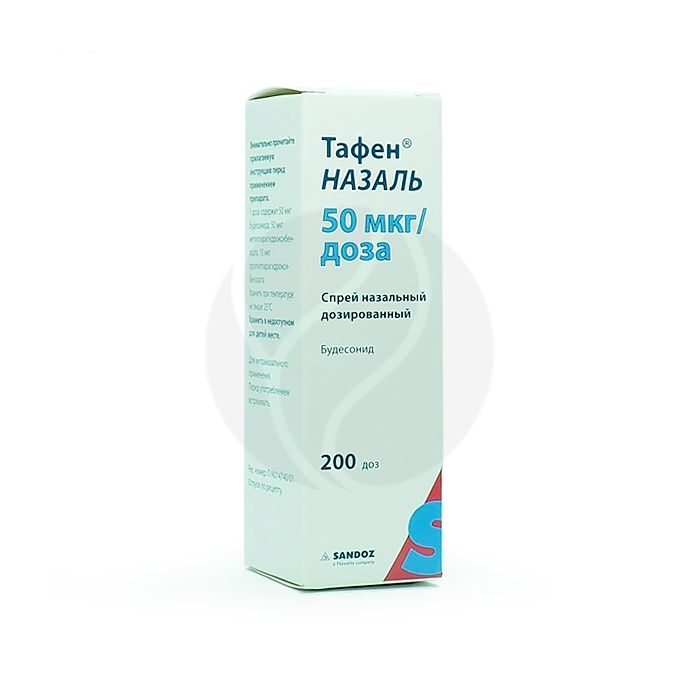Tafen Nasal nasal spray dosed 50mcg / dose, 200 dose
Expiration Date: 05/2027
Russian Pharmacy name:
Тафен Назаль спрей назальный дозированный 50мкг/доза, 200 доз
prevention and treatment of seasonal and perennial allergic rhinitis;
non-allergic rhinitis;
polyps of the nose.
Adults and children over the age of 6 years at the beginning of therapy are prescribed 2 doses (50 mcg of budesonide) in each nostril 2 times / day. The usual maintenance dose is 1 dose in each nostril 2 times / day or 2 doses in each nostril 1 time / day in the morning. The maintenance dose should be the lowest effective dose that relieves the symptoms of rhinitis.
The maximum single dose is 200 mcg (100 mcg in each nostril), the maximum daily dose is 400 mcg for no more than 3 months.
For full therapeutic effect, regular and correct use is required.
If a dose is missed, it should be taken as soon as possible, but not less than 1 hour before taking the next regular dose.
Dosed nasal spray in the form of a homogeneous suspension of white or almost white color.
Active substance:
budesonide
fungal, bacterial and viral infections of the respiratory tract;
active form of pulmonary tuberculosis;
hypersensitivity to budesonide or any other component of the drug.
pharmachologic effect
GCS for intranasal use. It has a pronounced anti-inflammatory and anti-allergic effect. When used in therapeutic doses, it practically does not have a resorptive effect. Does not possess mineralocorticoid activity, is well tolerated with long-term treatment. The drug has an inhibitory effect on the release of inflammatory mediators, increases the synthesis of anti-inflammatory proteins, and reduces the number of mast cells and eosinophilic granulocytes. Budesonide reduces the release of toxic proteins from eosinophils, free radicals from macrophages and lymphokines from lymphocytes. It also reduces the binding of adhesive molecules to endothelial cells, thus reducing the flow of leukocytes to the site of allergic inflammation. Budesonide increases the number of ?-adrenergic receptors in smooth muscles.The drug inhibits the activity of phospholipase 2A, which leads to inhibition of the synthesis of prostaglandins, leukotrienes and PAF, which induce an inflammatory response. Budesonide also inhibits the synthesis of histamine, which leads to a decrease in its level in mast cells.
TafenЃ nasal reduces the severity of symptoms in allergic rhinitis, suppresses the late and early phases of the allergic reaction and reduces inflammation in the upper respiratory tract. Improvement of the condition is noted 2-3 days after the start of treatment.
Indications of the drug TafenЃ Nasal
prevention and treatment of seasonal and perennial allergic rhinitis;
non-allergic rhinitis;
polyps of the nose.
Dosage regimen
Adults and children over the age of 6 years at the beginning of therapy are prescribed 2 doses (50 mcg of budesonide) in each nostril 2 times / day. The usual maintenance dose is 1 dose in each nostril 2 times / day or 2 doses in each nostril 1 time / day in the morning. The maintenance dose should be the lowest effective dose that relieves the symptoms of rhinitis.
The maximum single dose is 200 mcg (100 mcg in each nostril), the maximum daily dose is 400 mcg for no more than 3 months.
For full therapeutic effect, regular and correct use is required.
If a dose is missed, it should be taken as soon as possible, but not less than 1 hour before taking the next regular dose.
Side effect
From the respiratory system: irritation of the mucous membrane of the nose and throat, epistaxis, cough; less often there is dryness of the nasal mucosa, sneezing.
Dermatological reactions: dermatitis, urticaria, rash are noted.
Others: fatigue, dizziness.
In exceptional cases, when using nasal corticosteroids, perforation of the nasal septum, angioedema, loss of smell, tachycardia, and growth retardation were noted.
When using the drug, side effects develop very rarely and are transient.
Contraindications for use
fungal, bacterial and viral infections of the respiratory tract;
active form of pulmonary tuberculosis;
hypersensitivity to budesonide or any other component of the drug.
Application during pregnancy and lactation
The use of the drug TafenЃ nasal during pregnancy is allowed only if the expected benefit to the mother outweighs the possible risk to the fetus.
If necessary, the appointment of the drug during lactation, breastfeeding should be discontinued.
Application in children
The drug is prescribed for children over 6 years old.
special instructions
When switching from treatment with systemic corticosteroids to treatment with a nasal spray, due to the risk of adrenal insufficiency, caution is required for the period of restoration of the function of the hypothalamic-pituitary-adrenal system.
Since corticosteroids slow down wound healing, caution should be exercised when prescribing TafenЃ nasal to patients who have recently undergone a trauma or nasal surgery.
For a full therapeutic effect in allergic rhinitis, it is required to take the drug regularly.
It is recommended to avoid contact with eyes.
Influence on the ability to drive vehicles and use mechanisms
TafenЃ nasal does not affect the ability to drive a car or machinery.
Overdose
Accidental overdose of TafenЃ nasal does not cause any obvious symptoms. Acute overdose is unlikely.
With prolonged use of high doses, as well as with the simultaneous administration of other corticosteroids, symptoms of hypercortisolism may appear.
In this case, the drug should be discontinued, gradually reducing the dose.
Drug interactions
The simultaneous use of the drug TafenЃ Nasal with inducers of microsomal oxidation (phenobarbital, phenytoin, rifampicin) can reduce the effectiveness of the former.
Methandrostenolone, estrogens, ketoconazole enhance the effect of budesonide.

